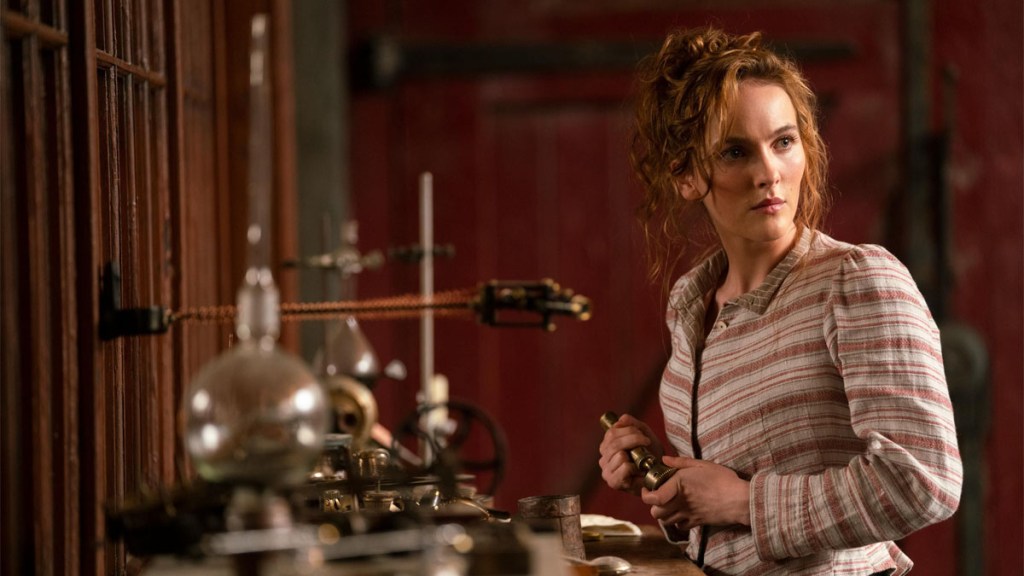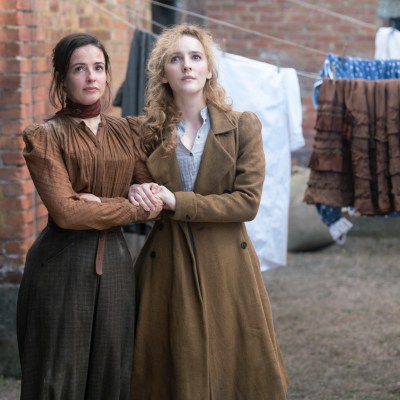Sky Atlantic’s The Nevers Proves That Good Things Come to Those Who Wait
This article contains spoilers for The Nevers episode 1 but not for future episodes.
The Nevers is a series that often defies description. A Victorian-set fantasy adventure that features a gang of primarily young women who gain supernatural and superhuman abilities, it’s a story about everything from faith and prejudice to hope and change. Its narrative is sprawling and frequently confusing, with no real initial sense of how its disparate pieces connect to one another. (Or don’t.) And it features at least a dozen major characters who run the gamut from heroes to villains – and sometimes both at once.
There’s the mysterious Amalia True (Laura Donnelly) who runs an orphanage devoted to helping the gifted known as “The Touched” find refuge, safety, and something like a family, and the mad murderess known as Maladie (Amy Manson) who claims to have seen a God that asks her to kill. Wealthy heiress Lavinia Bidlow (Olivia Williams) seems comfortable enough helping the Touched as long as it’s crystal clear they’re still society’s abnormal charity cases; dark doctor Edmund Hague (Denis O’Hare) is running deadly experiments on kidnapped Touched girls; and posh general degenerate Hugo Swann (James Norton) runs what appears to be a Touched-themed sex parlor.
Through these characters and their seemingly disconnected plotlines, The Nevers wrestles with big themes, probing everything from questions of power and who gets to wield it to the insidious nature of cultural misogyny and the messy ethics of free will and predestination. The Touched, after all, are almost all marginalised young women and people of colour who have never had access to the sort of agency their abilities now theoretically grant them. Yet none of these abilities is a panacea for the problems they face and, in many cases, actually makes things worse for them than they were before.

And this is all before you get to the flashback that depicts an alien spaceship gliding through the skies above London and sprinkling the city with orbs of glittering light that seem to be the ultimate source of the Touched’s strange abilities. Yes, on top of everything else, this is a show where aliens are also very much a thing.
Where did the ship come from? Is there a reason some individuals are Touched and others not? Why is Maladie murdering people? What’s the deal with that cartoonishly evil doctor? Why did Amalia try to kill herself? And are those ninja-like fighting skills somehow part of her gift? What, exactly, is even happening?!
Like many of its characters and their bizarre abilities, The Nevers is a show we largely have to accept on faith from the start. As viewers, we have to trust that this is a story whose wildly disparate pieces will one day intersect and sense will ultimately be forged from what is, on paper, a truly chaotic beginning. They do and it is – only perhaps not in the way that anyone expected. (And I truly mean that in the best way possible.)
Modern television viewers have been conditioned to expect a trick, to look for a shock reveal in every show on their screens. (Looking at you, people who ask whether a murder even happened in Mare of Easttown at all.) Episode explainers and breakdowns of complex fan theories are a small cottage industry online, and we instantly want answers to questions we have barely thought to even ask yet.
It’s certainly easy to engage with The Nevers in this way. There are hints to follow and rabbit holes to go down. Characters know things they shouldn’t. Seemingly bizarre throwaway lines frequently resurface. Things that just feel weird… well, that’s because they actually are. There are tidbits that point to larger truths – both metaphorical and otherwise – sprinkled throughout this show, and it’s certainly fun to try and figure out for yourselves what, if anything, they might mean.
But The Nevers is not a series that gives up its secrets easily. Some viewers will almost certainly have checked out by the time the series pulls the rug out from under everything we thought we knew about it in its half-season finale, revealing its scope was always much larger and more complicated than the “Victorian X-Men” framing it was initially sold as, embracing not just predictable themes of otherness and oppression, but other thorny questions like whether humanity can ever truly be saved from itself.
At its heart, The Nevers is a quiet testament to the power of patience, a story that spends weeks carefully slotting various disparate pieces together and building toward something that is, at the end of the day, genuinely surprising and wildly ambitious. Does the show perhaps take a bit too long to get to the meat of its story? Maybe. (Probably.) Is it worth the wait anyway? Yes, absolutely.

A gift to viewers that stick with it through early moments that often felt like we were watching four different series fighting under a blanket, The Nevers fully rewards those who were willing to believe that there was always a method to its madness. In its sixth episode, it veers hard into a new world and embraces a profound story about the human condition that’s much more expansive than anything viewers likely expected up until this point. It’s a rare thing for a series to trust its audience in the way that this show does, to believe that they’ll wait for a turn they don’t know is coming, but television as a whole might be better if more series did the same.
The Nevers’ steampunk tendencies place the show itself squarely in the intersection of the past and the future that is so frequently epitomised by the Victorian era, a moment at which it seems like anything is – or ought to be – possible. A time of intense transformation in almost every area of human life, innovation roars through the worlds of industry, science, and politics at a rate that surely must have felt something like magic to those living through it. Electricity, the wireless, the x-ray – this is the first generation that is, as the vaguely villainous Lord Massen puts it in the series’ pilot, “accustomed to the impossible”. That The Nevers itself should ultimately exist at a similar crossroads isn’t surprising.
A show about the future masquerading in a costume of the past, The Nevers itself a story of change and transformation, one that its viewers experience alongside the series’ main character. Yes, it often asks more questions than it answers – especially in its initial episodes – and its often frustrating lack of direction can make you wonder if the show actually has any at all. But The Nevers is a series that’s greater than the sum of its parts, and one that will ultimately stay in your memory long after the first half season’s credits roll.
The Nevers episodes one to six are available to stream on NOW in the UK.
The post Sky Atlantic’s The Nevers Proves That Good Things Come to Those Who Wait appeared first on Den of Geek.
From https://www.denofgeek.com/tv/the-nevers-is-worth-watching-for-the-twist/



